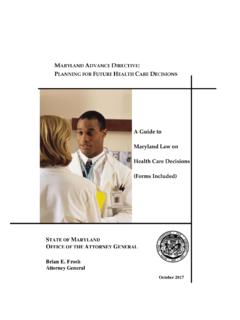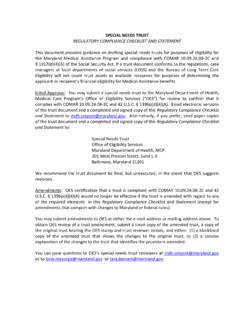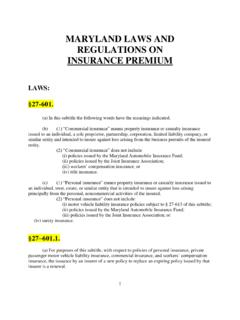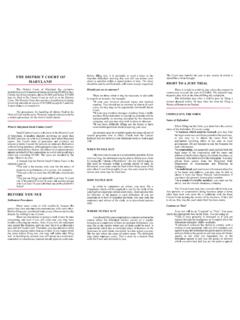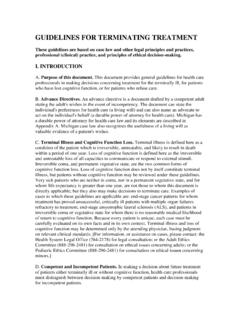Transcription of Maryland Attorney General’s Office
1 Maryland Attorney General s Office Brian E. Frosh Attorney General SUMMARY OF Maryland health care DECISIONS ACT* As Amended Through 2021 I. Informed Consent The health care Decisions Act does not affect the doctrine of informed consent, which applies to treatment issues in the current clinical context. A patient with capacity has the right to decide these issues, including whether life-sustaining procedures should be used. II. Definition of Medical Conditions Specified in the Act Terminal Condition: An incurable condition that makes death imminent. The term imminent is not defined, so the determination is left to reasonable medical judgment. End-Stage Condition: An advanced, progressive, irreversible condition caused by injury, disease, or illness: (1) that has caused severe and permanent deterioration indicated by incompetency and complete physical dependency; and (2) for which, to a reasonable degree of medical certainty, treatment of the irreversible condition would be medically ineffective.
2 Death need not be imminent. Persistent Vegetative State: An irreversible loss of consciousness, despite reflexive nerve and muscle activity. III. Advance Directives The Act allows an adult (or an emancipated minor) who has decision-making capacity to deal with future health care issues by any of the following three methods: written instructions authorizing the provision, withholding, or withdrawal of health care , sometimes called a decisional directive or living will; * This summary does not contain full detail about every topic. The full text of the Act is available at a written appointment of an agent to make health care decisions for the patient, sometimes called a proxy directive or durable power of Attorney for health care ; and an oral statement to a physician, physician assistant, or nurse practitioner leaving instructions or appointing an agent. Legal Requirements: Legal Requirements: With some limited exceptions, the Act requires that a written or electronic advance directive be witnessed by two adults in the physical or electronic presence of the person; neither witness may be the person s health care agent, and at least one witness must have no financial interest in the person s death.
3 It need not be notarized. Advance directives created entirely by electronic means are authorized. The advance directive s electronic signatures must meet certain technical requirements. A properly signed electronic advance directive may be unwitnessed if the person s identity is authenticated in accordance with the National Institute of Standards and Technology Special Publication 800-63-2: Electronic Authorization Guideline, or if replaced, the replacement guideline. An oral advance directive must be made to a physician, physician assistant, or nurse practitioner with one witness present, documented in the patient s medical record, and signed and dated by the physician, physician assistant, or nurse practitioner and the witness. If a health care agent is named, the health care agent may not be an employee, owner, or operator of a health care facility where the patient is being treated, unless that individual would also qualify as a surrogate.
4 An agent may not be an individual who is the subject of a protective order regarding the patient. If the patient and the patient s spouse have executed a separation agreement or one of them has filed for divorce, the spouse may not be an agent unless the patient indicated an intent to have the spouse serve as the patient s agent anyway. Advance directives authorized in accordance with the remote witnessing and electronic signature provisions of Executive Order issued during the COVID-19 state of emergency continue to be legally valid. Forms: Individuals may prepare documents worded as they choose. The Act includes an optional advance directive form, allowing individuals to appoint a health care agent; specify whether or not they want life-sustaining procedures if they are in a terminal condition, persistent vegetative state, or end-stage condition; or both. The form allows individuals, if they wish, to make a different decision regarding the provision, withholding, or withdrawal of artificial nutrition and hydration.
5 Implementing Instructions: If an advance directive does not name a health care agent but does instruct that life-sustaining procedures be withheld or withdrawn in the event of a terminal or end-stage condition or persistent vegetative state, the advance directive may be implemented only if the patient s attending physician and a consulting physician or nurse practitioner certify, to a reasonable degree of medical certainty, that the patient is in a terminal or end-stage condition, or if the patient s attending physician and a consulting physician with special expertise certifies that the patient is in a persistent vegetative state. Authority of Agent: A health care agent s authority is defined by the individual creating the advance directive. Unless the advance directive provides otherwise, a health care agent has authority to decide about life-sustaining procedures and, unlike a surrogate decision maker, may decide to forgo life-sustaining procedures even if the patient has not been certified to be in one of the Act s three specified conditions.
6 Unless the advance directive provides otherwise, an agent is to make a decision that is consistent with the patient s wishes or, if those wishes are unknown or unclear, that is in the patient s best interests. If the individual has given unambiguous instructions about life-sustaining procedures in the same or another legally valid advance directive that are intended to be followed strictly, the agent is obliged to carry out those instructions. Pregnancy: The optional statutory form has space for a woman to say whether pregnancy would have any effect on her decision about life-sustaining procedures. Organ Donation: The Act includes an optional form called After My Death that may be used to donate organs or tissue, to donate one s body for medical research, and to indicate desired funeral arrangements. Note: if a person wishes to donate his or her body for medical research, it is critical that prior arrangements be made with the institution to which the body is to be donated.
7 The Maryland Anatomy Board may also be contacted at 1-800-879-2728. IV. Surrogate Decision Making If a patient has not picked a health care agent, or if no health care agent is available, and the patient is no longer able to make health care decisions personally, as determined by the attending physician and a consulting physician or nurse practitioner, a surrogate has authority to make these decisions. Surrogates are listed in priority order; individuals in a particular class may be consulted only if all individuals in the next higher class are unavailable: (1) a guardian of the person, if one has been appointed; (2) the patient s spouse or domestic partner; (3) a child of the patient; (4) a parent of the patient; (5) an adult brother or sister of the patient; or (6) a friend or other relative of the patient who briefly describes, in an affidavit, enough regular contact with the patient so as to make the surrogate familiar with the patient s activities, health , and personal beliefs.
8 No particular form of affidavit or other documentation of surrogate status is specified in the Act. An individual who is the subject of a protective order regarding the patient may not be a surrogate. If the patient and the patient s spouse have executed a separation agreement or one of them has filed for divorce, the patient s spouse may not be a surrogate. Disputes Among Surrogates of Same Class: A health care provider must refer these disputes to a patient care advisory committee (often called an ethics committee ). If the committee makes a recommendation, the patient s physician may follow it without risking liability for suits based on lack of consent or authorization. Standards for Surrogates: A surrogate is to make a decision that is consistent with the patient s wishes or, if those wishes are unknown or unclear, that is in the patient s best interests. The Act includes factors for the surrogate to consider in determining the patient s wishes.
9 It also includes a definition of best interest. Surrogates and Life-Sustaining Treatment: A surrogate may consent to the withholding or withdrawal of life-sustaining procedures if: (1) the patient s attending physician and a consulting physician or nurse practitioner certify, to a reasonable degree of medical certainty, that the patient has a terminal or end-stage condition; or (2) if the patient is in a persistent vegetative state as certified to a reasonable degree of medical certainty by the attending physician and a consulting physician who is a neurologist, neurosurgeon, or other physician who has specialized expertise in the evaluation of cognitive functioning. A surrogate may not consider a patient s pre-existing, long-term mental or physical disability in making a decision to withhold or withdraw life-sustaining procedures. A surrogate who is a guardian usually must obtain the court s permission to authorize the withholding or withdrawal of life-sustaining procedures.
10 V. Medical Orders for Life-Sustaining Treatment (MOLST) form A Medical Orders for Life Sustaining Treatment or MOLST form contains medical orders regarding life-sustaining treatments, the use of medical tests, whether to transfer a patient to a hospital and any other matter considered appropriate by the Department to implement the treatment preferences of patients. A MOLST form is not an advance directive. A MOLST form contains written medical orders related to a patient s medical condition. The Department of health and Mental Hygiene must adopt regulations that specify the MOLST form and its instructions. The Department s regulations regarding the MOLST form are contained in COMAR In accordance with the Department s regulations, certain health care programs and facilities are required to complete a MOLST form for each newly admitted patient and must offer the patient, the health care agent, or the surrogate decision maker the opportunity to participate in the completion of the MOLST form.

